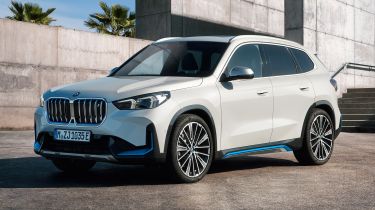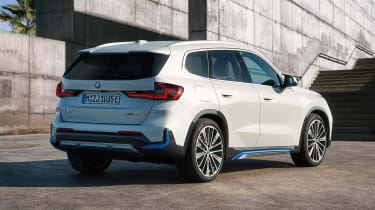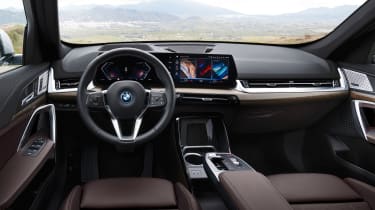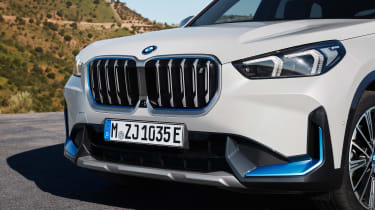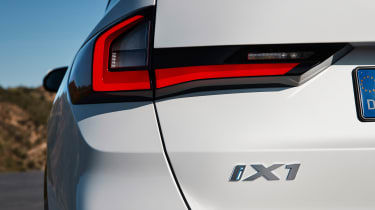New electric BMW iX1 SUV has 272-mile range
The iX1 is BMW’s smallest electric SUV, sitting below the larger iX3
- Maximum range of 272 miles
- ‘Curved Display’ infotainment system
- On sale November 2022
After months of teasers, the BMW iX1 has finally been revealed. Unveiled alongside the new combustion-engined X1, the iX1 utilises a fully electric powertrain and boasts the brand’s latest tech as well as a range of 272 miles.
 The best mid-size SUVs – our 2025 top picks
The best mid-size SUVs – our 2025 top picks
Pricing for the BMW iX1 is yet to be revealed, but we expect it to cost from around £45,000 when it goes on sale in November this year – a month after its X1 sibling. Electric SUVs are very much in vogue at the moment, with the iX1 set to join a very competitive segment, rivalling the likes of the Mercedes EQA and forthcoming Genesis GV60.
2022 BMW iX1: design and exterior
The BMW iX1 joins the brand’s range at a confusing time in terms of design language; some models have now turned to adopting a split headlight design and obtuse kidney grilles, while others are more conservative in their styling. In an attempt to appeal to the masses, the BMW iX1 is more the latter, with a look very similar to that of the 1 Series hatchback on which it’s based.
That’s not to say the iX1 already looks dated, however; the new car wears a slimmer set of headlights than the outgoing petrol X1. These flank a trim piece designed to look like a traditional BMW kidney grille. This will house a large portion of the car’s driver assistance and safety systems, such as the radar for the adaptive cruise control function.
Overall, the iX1 looks very similar to the new X1 on which it’s based. Nonetheless, there are a few ways to tell the two apart; iX1 cars receive several blue accents around the exterior, something that has historically been characteristic of the German brand’s electrified models. The BMW iX1 will also sit on unique sets of alloy wheels, ranging from 17-20 inches in diameter; these are more aerodynamic than the ones seen on the standard X1 and should help to improve range figures.
Interior and technology
Those that have spent any amount of time in the new BMW 2 Series Active Tourer will quickly find themselves at home in the iX1. The electric SUV adopts BMW’s latest iDrive infotainment system; this made its debut in the larger iX SUV and features a contemporary curved display panel. This consists of two individual screens: a 10.25-inch touchscreen, bolstered by a 10.7-inch digital instrument cluster. Unlike BMW systems of old that utilised a swivel wheel, this new one functions as a touchscreen and can be configured to the driver’s preferences via widgets on the home screen.
Looking around the rest of the cabin, the iX1 appears suitably premium, with plenty of soft-touch plastics, leathers and metal trim. There are very few physical buttons to clutter up the overall look of the interior; unfortunately, this means that the climate control functions have been relegated to the touchscreen, meaning they will likely be difficult to operate on the move.
The BMW X1 has marginally grown in size over the previous generation, meaning the new iX1 will also benefit from this growth spurt. The wheelbase (the distance between the front and rear wheels) has increased by 20mm, while the car is now 50mm longer overall than before. This has come as a benefit for rear legroom and boot space, both important aspects for a car that is mainly targeted at families. The iX1’s boot measures at 490 litres, which is far larger than the meagre 345 litres found in the Mercedes EQA; however this is still 50 litres less than what is offered in the regular X1.
Powertrain and range
At launch, BMW will only offer the iX1 with one battery and electric motor setup. Dubbed the iX1 xDrive30, this model uses two electric motors that work together to produce xDrive all-wheel-drive and 309bhp at the wheels. BMW claims the iX1 can manage 0-62mph in just 5.7 seconds, making the electric SUV the fastest version of the X1 on sale, alongside the plug-in hybrid.
The iX1 xDrive30 can travel up-to 272 miles on a single charge – identical figures to those seen in the Volvo C40. Those behind the wheel of the iX1 can choose to manually preheat the battery in order to optimise charging efficiency. When you do find a compatible public charger, the iX1 can charge at speeds at up-to 130kW, allowing for a 0-80% charge in around half an hour.
What does this mean for car buyers?
The BMW iX1 will likely be a popular addition to the BMW lineup, with the brand’s only current entry-level electric car being the ageing i3 hatchback. While a 270-odd mile range seems a bit low compared with the figures seen on the likes of the Tesla Model Y, it’s pretty average for this segment and should be plenty for those who spend most of their time driving around town. We are yet to get behind the wheel of the iX1, so it is hard to say at this stage whether it will be worth the inevitable premium it’ll demand over the plug-in hybrid X1, which will feature similarly-low running costs.
Ready to make the switch to an EV? Read our list of the top 10 best electric SUVs
Recommended

New Subaru Trailseeker revealed as rugged electric SUV with 375bhp

New Subaru Solterra brings more range, power and polish
Most Popular

Omoda E5 targets rivals: now with zero deposit and APR

Ford Puma Gen-E driven: Electric charmer or too little, too late?
Tips & advice

Car dashboard warning lights: what does each symbol mean?

Electric car charging stations: public networks, charger types, apps and maps


